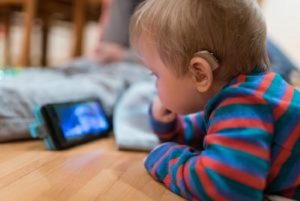
Assistive listening devices can be used to help treat Auditory Processing Disorder.
When it comes to hearing loss, the first step is figuring out which type you are suffering from. Hearing loss can stem from an Auditory Processing Disorder that affects children. It is one of the more rare types of hearing loss, affecting about 5% of school-aged kids. Here is what you need to know about Auditory Processing Disorder (ADP).
Symptoms
Often times, it can be tricky to diagnose ADP because they can hear sounds that are given one at a time. Typically, kids with ADP can’t recognize small differences between sounds in words, especially if there is a lot of background noise. Here are a few more symptoms of Auditory Processing Disorder:
- Overly bothered by loud/sudden noises
- Easily distracted
- Upset by noisy environments
- Difficulty following directions
- Speech, writing, or reading difficulties
- Hard to follow conversations
Unfortunately, the cause of ADP is still unknown. However, studies suggest that it can have something to do with head trauma, lead poisoning, or chronic ear infections.
Diagnosis
Audiologists look for five main problems when diagnosing a child with Auditory Processing Disorder:
- Figure-ground Problems: A child is unable to pay attention if there is a lot of background noise. They may get frustrated in a loud classroom setting.
- Memory Problems: A child may have difficulty remembering certain information such as directions or study materials. This can be an immediate reaction or a delayed one
- Discrimination Problems: Difficulty making out the difference between similar words and sounds. This can impair their ability to read, spell, and write.
- Attention Problems: Difficulty remaining focused or listening long enough to complete a specific task.
- Cohesion Problems: Higher-level listening tasks may become more difficult. This includes things like drawing, understanding riddles, and completing verbal math problems.
Treatment
There is no cure for ADP, however there are a variety of treatment options. Audiologists typically use assistive listening devices and speech therapy to help with the symptoms. A frequency modulation system is an assistive listening device that helps to reduce background noise and amplify people’s voices. This should be combined with consistent therapy for the best results. There are also computer programs that are made to help the brain better process sounds.
Contact Bay Area Audiology Today for Your Hearing Evaluation
If you are concerned about hearing loss or seeking hearing evaluations, tinnitus evaluations, or hearing aid assistance, our doctors are ready to help. We are passionate about helping all of our patients improve their quality of life through better hearing. We also believe that patient education is critical, so you won’t be lead through endless sales pitches at our office. If you are interested in hearing how we can help you hear even better, contact us at (410) 838-4327 or online. For more hearing tips and articles, follow Bay Area Audiology on Facebook,Twitter,Google+, Pinterest, and LinkedIn.
